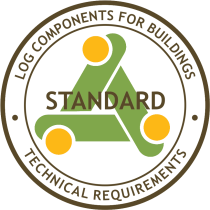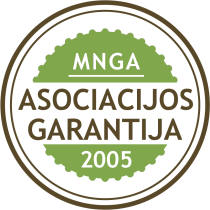Our partners
There are several dedicated scientific, research and standardisation institutions in Lithuania, which initiate research in the area of the wood industry, develop new materials and products, participate in standardisation and certification activities, and contribute to the development of the Lithuanian wood industry.
Research of structural timber by the Vilnius Gediminas Technical University
The Vilnius Gediminas Technical University (VGTU), Department of Steel and Timber Structures, carries out research in wooden structures, provides education and training programmes for future experts in wooden structures. The Department of Steel and Timber Structures (MMKK), in co-operation with the Innovatory Scientific Institute of Special Structures KOMPOZITAS, carries out researches in the area of timber and composite structures, monitors the conduct of building structures, and tests new products in the area of wooden construction.
The VGTU collaborates both with local and foreign construction and research companies, consults companies on the issues of designing and assessing the structures of contemporary wooden buildings. In addition, the aforementioned institutions conduct research in different elements and assemblies of wooden structures.
Timber-concrete composite floor systems represent a unique technology for adding to load-bearing capacity and efficiency of timber floors, widely used all over the world in buildings, bridges and renovation of historically valuable heritage buildings since the first decades of the last century. Since 2001, a number of experimental researches in timber-concrete connections have been carried out at the laboratory of the Department of Steel and Timber Structures of the Vilnius Gediminas Technical University. The results of this research work are published in scientific publications and international conferences.
Timber roof trusses connected using stainless steel plate-type finger joints have been used in the USA, Canada, Germany, Scandinavian countries for about 30 years. The first use of these effective building structures in Lithuania is dated 1997 when KOMPOZITAS Institute and Danish company EuroTruss signed an agreement on the research of the above-mentioned effective wooden roof and floor trusses at the laboratory of the Vilnius Gediminas Technical University. Since then, several final theses for master???s degree have been written and defended on this topic. Application of these advanced wooden roof trusses is gaining popularity on construction sites in Lithuania.
The Department of Steel and Timber Structures and Scientific Institute KOMPOZITAS explores the gaps likely to occur in kiln-dried solid wood elements, the behaviour of cracked structures and the reasons of occurrence thereof.
Research of wood materials and products by the Kaunas University of Technology (KTU)
Kaunas University of Technology (KUT), the largest technical university in the Baltic States, is one of the largest institutions of higher education of Lithuania. It contains 13 faculties with 75 departments, 28 centres, 5 faculty institutes and 17 research laboratories; 11 institutes with 5 centres and 9 research laboratories; 4 centres with 4 research laboratories and 10 administration and service subdivisions. Studies and research have become vitally important tools in the creation of a humanized technology. The KUT scientists take part in different national and international programmes. Research co-operation and activities are mainly related to the participation in European Union programmes.
The Department of Mechanical Wood Technology will work directly with the project. Department of Mechanical Wood Technology (DMWT) with 3 doctors and associate professors, 1 lecturer have extensive experience in S&T activities for forest and woodworking industry. Main research and technology development areas cover wood science; hydrothermal treatment, modification and processing of timber; testing of structural timber and wood-based materials.
The Department of Mechanical Wood Technology has the Research and Testing Laboratory of Wood Materials and Products (LWMP). The laboratory carries out applied research, accredited and non-accredited testing and expertise, professional training and qualification improvement activities.
The LWMP carries out accredited testing in the following areas:
Glued laminated timber;
Wooden flooring;
Wood-based panels;
Structural glue.
Research and development activities of the laboratory are aimed at the development of the added value for wood products, development of applications of load-bearing structural timber elements demonstrating high performance characteristics, particularly with regard to strength-graded glued laminated finger-jointed timber. Engineering wood products and derivatives of new generation can be tested and expert-assessed as to the bending, tensile, compression shear strength. Strength of glue lines, antiseptic-antipyretic wood impregnation parameters, fire-wood colorie content are estimated in the laboratory. In addition, the laboratory renders production quality control and management services, equipment efficiency or material input and output calculation services.
LWMP???s experts have big academic, scientific and practical experience in the KUT; therefore a lot of activities are aimed at holding seminars, conferences and training courses.
Efficient and high-quality operations of the laboratory are ensured by co-ordinating the testing methods with standardisation technical committee TC 17 "Mediena" (???Wood???), established on the base of the Department of Mechanical Wood Technology and responsible for the standardisation of the wood sector in Lithuania.
Standardisation Technical Committee LST TK 17 "Mediena"
LST/TC 17 "Mediena" is a voluntary association of enterprises and organisations manufacturing, processing and marketing wood and wood derivatives, scientific and training institutions, testing laboratories, concerned experts from public authorities (authorised representatives). It is established on the base on the Lithuanian Standards Board (LST).
Today there are about 50 members at LST/TC 17 "Mediena". These are Lithuanian forest enterprises, wood industries, scientific establishments, ministries, associated business entities (including the Association of Log Houses Producers), etc.
LST/TC 17 is devised for drafting Lithuanian standards in such areas as forestry, production and processing of wood materials, co-operation with international, regional and foreign standardisation technical committees, accumulating information on standardisation-related issues and providing legal and natural persons with such information in the established procedure.
LST/TC 17 is responsible for the national standardisation in such areas as forestry, production and processing of wood materials. In 2008, there are about 260 standards prepared by LST/TC 17 "Mediena" and approved by the Lithuanian Standards Board (LST).
The main standardisation trends of LST/TC 17 are as follows:
Forestry (forest science, forest genetics and selection, forest regeneration and afforestation, forest handling, forestry, logging),
Wood (round and sawn timber, structural timber),
Wood-based panels (glued laminated timber, fibreboards, particleboards, testing methods),
Wooden houses;
Wood preservatives;
Technologies of wood and derived products.
National forest-based sector technology platform of Lithuania
On June 2006, leading Lithuanian associations in the forest and wood sector (including the Association of Log Houses Producers), representatives of scientific and business sectors signed an agreement and established the national forest-based sector technology platform (NTP). Today there are 16 member organisations and more than 20 associated members of the platform.
This platform is a standing body aimed at attuning the interests of forest-based sector organisations (business entities, scientific and associated structures) acting on the basis of the Joint Activity Agreement. Issues of the development and future perspectives of the sector are implemented through meetings of the members. The meetings of the members are followed by assessment of projects of stakeholders" groups, formation of clusters, submission of initiatives and recommendations to the Government of the Republic of Lithuania.
The NTP is a member of the European Forest-Based Sector Technology Platform (FTP) and participates in the process of the forest and wood industry on European level.
Objectives of the NTP are to combine business potential and scientific achievements, to strengthen positions of the forest-based sector in the social, business and economic national and global context. The platform initiates scientific research and innovations in forest and wood industries, facilitates co-operation between business and science.
The Vision Document for the European forest-based sector, as developed in 2007, provides for ensuring of sustainable activities of the forest sector, sufficient wood supplies and long-term competitiveness of wooden products.
The NTP co-ordinates the positions of associated national structures in the forest-based sector on EU level, defends common interests and collaborates with other sectors. The Association of Log Houses Producers, being one of the founders of the technology platform, actively shares in the activities of the platform, contributes to the development of the common forest sector strategy (vision). Implementation of the national strategy of the forest-based sector technology platform will create preconditions for carrying out research, which outcomes could be used in the wood construction industry.





